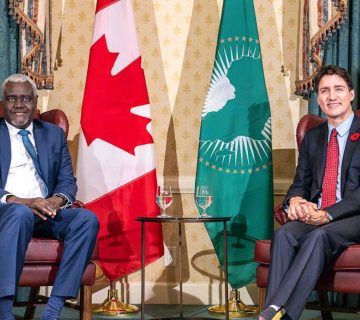During the 2003 Darfur conflict, a tribal (Arab–Abbala and Baggara ethnicities) militia, Janjaweed, emerged instrumental for former president Omar al-Bashir’s anti-insurgency campaigns in Darfur, Nuba Mountains, and Kordofan regions. However, this instrumentality came through killings, rape, and scorched earth tactics of the militia against ethnic minorities in the affected regions. The militia operated in the Darfur region between 2003 and 2008, committing gross atrocities and causing great hostilities, which partly led to Bashir’s indictment at the International Criminal Court (ICC) in 2009.
Metamorphosis into Indispensability
Despite the intervention of the United Nations, and subsequent cessation of hostilities in Darfur region, the Janjaweed militia proved indispensable to the former president for two reasons. First, the country still faced the threat of insurgency from several armed groups in the South and Bashir still needed the militia for counter-insurgency operations. In fact, the militia helped Bashir repress the protests of 2013, again proving strategic to his government’s stability. Second, the government wanted to control the proliferation of militias in the country, and thus, ‘regularizing’ the Janjaweed was seen as an effective way of controlling the threat of another armed group.
Thus, Bashir co-opted the Janjaweed militia in 2015, allowing them to serve as a separate military force, operating alongside Sudanese regular forces, in charge of ‘rapid support operations’ (of counter-insurgency nature) from 2017. Hence, the militia was renamed ‘Rapid Support Forces (RSF)’, allocated colossal budget, and has been growing in military strength and capabilities. Thus, the RSF secured considerable influence over Sudanese politics, almost serving as a ‘national guard’.
Another reason that has made RSF indispensable in Sudan, even after the military deposition of Bashir, is their involvement in the Saudi-Emirati coalition war against the Ansar Allah (Houthi) movement in Yemen. In this war, RSF is a core ground component of coalition forces serving in multiple regions of the country playing various roles, crucial to the Saudi-led war against the Houthis. The battle-hardened nature of the militia and their role in counter-insurgency and border protection (Chad-Sudan, and Sudan-Libya troubled borders) in Sudan, is an asset Saudi Arabia wanted in the campaign. The RSF serves in northern Yemen to create a buffer zone between Yemen and Saudi Arabia, because Saudi Arabia’s south-western provinces are targets of cross-border raids and missile attacks by the Houthis. The RSF has been crucial in the capture of Hajjah governorate by coalition forces, and is being utilized as a counter-insurgency special component for the Saudi-Emirati coalition campaign against the Houthis. Saudi Arabia and UAE are in turn providing financial support to the Transitional Military Council (TMC), for economic and fiscal stabilization, having pledged USD 3 billion this year. This support from the Gulf powers, is in part, for the country’s role in the war in Yemen.
RSF’s Growing Political Influence
The influence of RSF has grown, from the domestic sphere in Sudan, to the country’s foreign policy, especially as regards Sudan’s relations with the Middle East. In Sudan, the RSF commander, General Muhammad Hamdan Daqlu (a.k.a. ‘Hemetti’), was appointed the Vice Chairman of the 10-member ruling TMC in April this year.
After the military deposition of former president Bashir in April this year, and attendant relentless protests, the RSF militia’s role has become even more prominent. For instance, it has been used to disperse protesters. In June this year, its forces were used to carry out crackdowns which left over 100 people dead, and hundreds more injured, following the collapsed talks between the military and the protesters’ movement. This way, the RSF is acting as the vanguard of the establishment against the protesters’ movement’s demands for a civilian-led transition. Internationally, the RSF commander, Hemmetti, has been meeting diplomats in Khartoum and making diplomatic trips abroad, key among them, to Egypt and Saudi Arabia.
Salvaging the ‘Revolution’
To safeguard the aspirations of the Sudanese people, expressed through the popular uprising against the autocratic government of Omar Bashir, domestic, regional and international players should, among other approaches, re-evaluate the position of Hemetti and his RSF. His hard-line and repressive approach to the crisis in Sudan is not likely to create a conducive environment for peace and stability in Sudan. It is unfortunate that the establishment in Khartoum has let Hemetti drop roots across the political sphere in the country. Additionally, he has gained significant power in his branch of the military to the point he has been entrusted with foreign affairs. The United Nations has just this month stopped the United Nations-African Union Mission in Darfur (UNAMID) facilities from being transferred to RSF, possibly as operational bases. This is indicative of the growing influence of RSF.
Thus, to salvage ‘the people’s revolution’, peace players and the TMC should systematically relegate the role of RSF in transition talks. This can be done by making it a requirement for the TMC to present a unitary front, without any differentiation of interest, capacity, and role. Further, peace proposals should necessitate the unification of RSF with regular Sudanese forces, and spell out elaborate steps towards demilitarization of Sudanese politics during the transitional period. However, for the viability of this approach, various consequential armed groups should be included in a comprehensive peace process, to systematically blunt the role of RSF in the future of Sudan.
In the meantime, the TMC should withdraw the RSF from active positions and limit the forces’ role in managing the protests. The TMC’s chairman and the interim ruler of Sudan, Fattah al Burdan, should take full command of the situation in Sudan.
Edmond J. Pamba is a Research Assistant at the HORN Institute.
Photo Credit: AP



